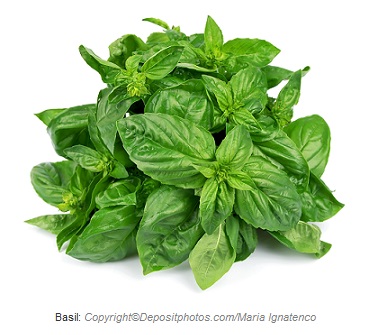Basil is a green leafy vegetable from mints family with a pungent aroma. Having a culinary  usage, basil loses its flavor by cooking. It could be used in dried or fresh forms. Each 100 grams of basil provides 3 grams of carbohydrates, 3 grams of protein and 2 grams of fiber.
usage, basil loses its flavor by cooking. It could be used in dried or fresh forms. Each 100 grams of basil provides 3 grams of carbohydrates, 3 grams of protein and 2 grams of fiber.
Average calories: 24 per 100 grams.
|
Basil: 100 grams |
|
|
Carbohydrate |
3 |
|
Fiber |
2 |
|
Protein |
3 |
|
Fat |
0 |
|
Calories |
24 |
Vitamins found in higher amounts: vitamins K, A, C, B9, B6 and B1.
Minerals found in higher amounts: manganese, copper, iron, calcium, magnesium and potassium.
Phytonutrients found in higher amounts and their health benefits: basil has flavonoids. They protect the cells against free radical damages. The two famous flavonoids in basil are orientin and vicenin.
The strong scent of basil comes from the phytonutrients “essential oils or volatile oils”, with different kinds of basil having different proportions of them. The most commonly studied essential oil is “eugenol”. Other essential oils are linalool, cineole, ocimene, citronellol, limonene, and myrcene. Essential oils have anti-microbial, antiviral, and anti-inflammatory properties.
The other phytonutrients in basil are carotenoids especially beta-carotene. They support healthy eyes and vision.
Basil makes the body alkaline, which could explain its effectiveness against cancers and acne and improving endurance in athletes.

